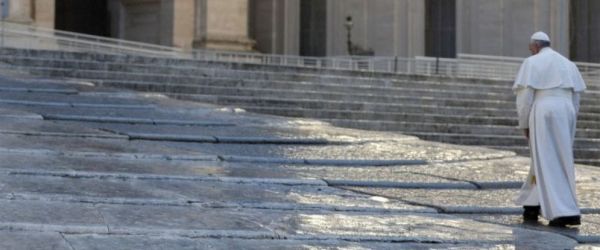Today’s Gospel passage (cf. Lk 17:5-10) presents the theme of faith, introduced by the disciples’ request: “increase our faith!” (v. 5). A beautiful prayer, which we should pray often throughout the day: “Lord, increase my faith!”. Jesus responds with two images: the grain of mustard and the willing servant. “If you had faith as a grain of mustard seed, you could say to this sycamine tree: ‘Be rooted up, and be planted in the sea,’ and it would obey you” (v. 6). The sycamine is a robust tree, deeply rooted in the ground and resistant to the winds. Thus, Jesus wishes to make it understood that faith, even if small, can have the power to uproot so much as a sycamine. And then to transplant it into the sea, which is something even more improbable: but nothing is impossible for those who have faith, because they do not rely on their own strengths but in God, who can do everything.
The faith comparable to the grain of mustard is a faith that is not proud and self-assured: it does not pretend to be that of a great believer at times making gaffes! It is a faith that, in its humility, feels a great need of God and in its smallness surrenders itself, trusting fully in Him. It is a faith that gives us the ability to look with hope at the alternate events of life, which helps us to accept even defeat, suffering, with the awareness that evil never has, never will have, the last word.
How can we understand if we truly have faith, that is, if our faith, while miniscule, is genuine, pure, sincere? Jesus explains this by indicating what the measure of faith is: service. And he does so with a parable which at first glance is somewhat disconcerting, because it presents the figure of an overbearing and indifferent master. But this master’s very way of doing things highlights what is the true core of the parable, which is the servant’s attitude of willingness. Jesus wishes to say that this is how people of faith are with regard to God: they completely give themselves over to his will, without calculations or pretexts.
This attitude toward God is also reflected in the manner of behaviour in the community: it is reflected in the joy of being at the service of one another, finding one’s reward already therein, and not in the recognition and gains that may derive from it. This is what Jesus teaches at the end of this narrative: “when you have done all that is commanded you, say, ‘We are unworthy servants; we have only done what was our duty’” (v. 10).
Unworthy servants, that is, without expecting to be thanked, without pretexts. “We are unworthy servants” is an expression of humility and willingness, which does much good for the Church and recalls the right attitude for working within her: humble service, of which Jesus gave the example, by washing the feet of the disciples (cf. Jn 13:3-17).
[Pope Francis, Angelus, 6 October 2019]












